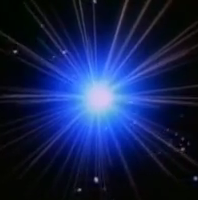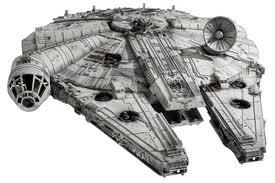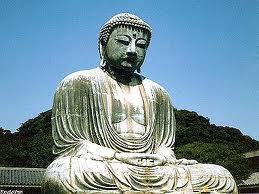I've always been a spiritual person. I grew up in a nominally Catholic home for the first part of my childhood, and became a "born again" Christian when I was a teenager, but I always possessed a sense of spirituality independent of the context of my religious upbringing.
My favorite - and best - subject in Catholic grade school was religion. I always scored the highest in that particular subject. I was drawn, even as a small child, toward the transcendent. Looking beyond myself, even beyond my physical surroundings, to search for something greater than either came easily for me. I always looked to the stars and beyond for that greater, transcendent something.
 |
I remember being six years old, pondering the universe. Filled with curiosity and excitement, I read book after book about the universe. I had a giant poster of the planets of our solar system in my room - back when there were nine planets - before Pluto got booted out of the planetary posse. I was born in 1975, and thus grew up with Star Wars. The thought of extra-terrestrial life intrigued my young mind, but what really piqued my curiosity was the question of whether the universe is infinite. My imagination ran wild with hypothetical scenarios. I envisioned alternate dimensions - parallel universes with different outcomes. I had visions of the Multiverse, although back then I didn't have the language to describe what I saw through my mind's eye.
I even had my own Spaceship of the Imagination with which to traverse these alternate worlds, although my vehicle of choice back then was, naturally, the Millennium Falcon.
Utilizing the power of a young boy's imagination, I traveled through the galaxies in the Falcon, onward to the edge of the universe, if there really was an "edge" of which to speak. I'd travel through one version of reality until I reached the outermost part of the universe. My young mind couldn't comprehend. Is this really the "end" of the universe? Does it really go no further? What's past the edge of space? Nothing? How could that be? Seeing no resolution to this quandry, I'd set new coordinates in the navigational computer and jump to an alternate universe: one that had no edges. But this universe proved just as perplexing. I'd travel beyond the stars, beyond the galaxies, to worlds never before seen by humanity. And I'd travel farther still. No matter how far I sailed, all I saw was the infinite black. How could this be? How can it just keep going, on and on, with no end? What's out there in that great expanse? Is anyone out there wondering who's over here on this side of infinity?
 |
I concluded at six years of age that, if the universe has edges, then god lives on the other side of the edge of the universe. That must be where heaven is. If the universe has no edges and goes on forever, then god himself must be the infinity, such that, if we could possibly travel far enough, at some point we would no longer experience the universe, but we would experience god. I had some deep thoughts for a kid. I was raised in a religious context, as I said, although during my childhood I was really the only one who took it all that seriously. God was always a part of my thinking. I felt equally drawn to the universe. Maybe Star Wars had something to do with that (along with E.T. and Close Encounters of the Third Kind), but from an early age I was drawn to the Cosmos. It was all I ever thought about. My dad used call me "Space Cadet" because of my obsession with the universe.
When I entered junior high, some things changed: I started noticing girls. I became interested in sports, and for the first time in my life became physically active. I discovered that I had a natural talent for basketball. Then I began studying the martial arts. This was around the time the Karate Kid movies hit theatres. I absorbed those movies in my adolescent years the way warriors internalized the teachings of Sun Tzu. Mr. Miyagi's culture intrigued me, which led to my personal quest to learn as much as I could about Asian culture, a passionate investigation that lasted close to two years. During this time, I became fairly well acquainted with (and drawn toward) Buddhism. I am compelled by many of Buddhism's precepts, even if I have never adopted its metaphysical claims. I was most drawn to the idea that we become burdened by our desires. I saw the dangers of materialism in this message, and by the time I became a teenager, I had declared myself a minimalist, and remain so to this day. I can fit everything I own in my car.
 |
But my religious upbringing got the best of me, and I became a Christian, or rather I became a different kind of Christian. I was no longer Catholic. I was (for lack of a better adjective) evangelical, although I would never have called myself that. I spent my high school years as a regular youth group attendee, went to the Christian teen conventions and summer Bible camp weeks. I attended Bible college afterward, and eventually graduated. I worked in ministry for close to a decade, and spent the first five years of my online life writing articles about god, religion, apologetics and philosophy of religion. I thought I was called by god to do ministry. At the very least, I had a strong desire to be part of something bigger than myself - something cosmic - so I found the idea that I had such a calling quite easy to believe.
I may have stepped back from both religion and belief in a god, but I never abandoned my sense of spirituality. This means nothing unless I define the word "spiritual." Some see the "spirit" much like they see the soul: as an incorporeal part of a person, even the part of the person that animates the flesh. The ghost in the machine. But my understanding is less like the mind-body dualism of Descartes (although not diametrically opposed to Descartes) and more closely associated with the dependent origination ("emptiness") of Buddhist philosopher Nāgārjuna. Who I am - my soul if you will - is the culmination, the amalgamation, the permutation, the synergy of every thing that has made me who I am, and continues to make me who I am becoming: all my experiences, memories, hopes, desires, dreams, pleasures and pains; every molecule that makes up my body; the interactions and relationships I have and have ever had with every person I have encountered; my DNA; the consciousness I possess that allows me to be both self-aware and cognizant of all these factors which make me what I am and who I am. Whether this includes some incorporeal element is beyond my ability to determine. Doesn't really matter either way.
When I speak of a spirituality that makes sense to me, I want you to understand my full meaning. Actually, I want you to experience my full meaning: to share in that sense of wonder and awe when considering the universe in which we inhabit an infinitesimally tiny speck; the fascination of discovery, both inward and outward; the pursuit of the transcendent in which we look beyond ourselves to something greater, like our planet, our galaxy, our universe - maybe even to what lies past the edges of space (if there are edges) - and to the solidarity of humankind that both encompasses us and transcends each of us; the sense of identity and belonging that comes with the connection we have with each other, our home planet, and indeed the universe itself. "We are all connected," Neil deGrasse Tyson said, "to each other biologically, to the earth chemically, and to the rest of the universe atomically." The thought that some of the same molecules in the air in my lungs could likely have been at one time in the lungs of Abraham Lincoln or Beethoven or René Descartes or Nāgārjuna or a velociraptor or Pol Pot or the guy who cut me off in traffic the other day fills me with such wonder and curiosity, even awe. When my children were born, when I watched the Perseid meteor shower on a country road at 3 AM with some of my closest friends, when I've been lost in music - any time I've watched Carl Sagan's "Cosmos" - I admired and even revered the awesome powers of nature, the incredible process in which life reproduces itself, the mind-boggling immensity of time and space, the incomprehensibilities of our universe contrasted with the limits of our intellects and imaginations. I am inspired by how much we've learned and humbled by how little we know. This - all of this and even more than I can think to write - is what I mean by spirituality.
 |
As I write these words, I know that this article is incomplete. I could write more and clarify concepts more concisely. I've been staring at this blog entry for over a week, adding a little bit here and a little bit there, and editing, erasing, changing and tweaking. I've been wanting to write about spirituality for a long time, but every time I make the attempt I'm never satisfied with what I write, and I scrap it. This is the first time I've deviated from that pattern. I don't think I'll be able to write about this topic and ever feel like I'm finished. It will always feel incomplete. As I wrote that last sentence, I was overcome by an intense feeling - dare I call it a spiritual experience - in which I nearly saw Buddha. I'm speaking metaphorically, of course, but the epiphany evoked that powerful an emotional response. It will always feel incomplete. My knowledge will always be incomplete. My thirst for learning will never be quenched. My wonder and curiosity will never be satisfied. My desire to love and be loved will never be sated any more than my longing to continue breathing air will be fulfilled.
But in that incompleteness I find perfection. The path never leads to Nirvāṇa in this life, and that's okay. The path is the goal.
Kaylee: "How come you don't care where you're going?"
Book: "'Cause how you get there is the worthier part."
— Dead-Logic








